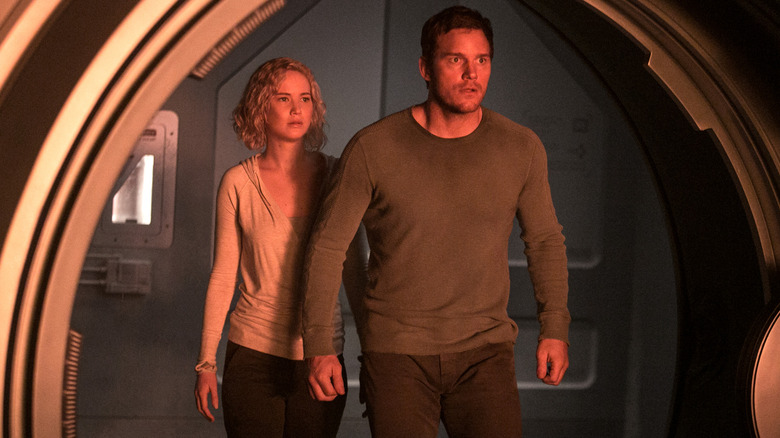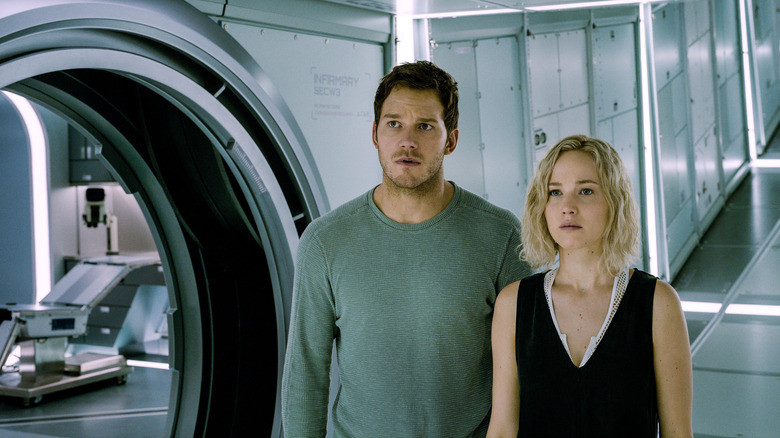Why Chris Pratt's Sci-Fi Movie Passengers Was Blasted With Backlash
What happens when a horror movie doesn't know it's a horror movie? You get "Passengers," the 2016 sci-fi film starring Chris Pratt and Jennifer Lawrence. Directed by Morten Tyldum and written by Jon Spaihts, the movie takes place aboard a spaceship transporting thousands of people to a distant planet in the aftermath of Earth's ecological collapse. When a malfunction causes one of the passengers, Jim (Pratt), to awaken from hypersleep 30 years into the vessel's 120-year journey, he's left with a dilemma: Should he live out the rest of his days on the ship alone, end his life prematurely, or wake up Aurora (Lawrence), the hot lady he's crushing on, and lie about what happened for as long as possible? I'm betting you've guessed what he does.
Jim's decision was meant to be a surprise. However, much like what happened with Matthew Vaughn's "Argylle," the film's "twist" was spoiled in reports long before its release. I distinctly recall getting a panicked request from a Sony rep asking that I edit that detail out of an article I had barely published for another website in 2016. It's almost like they realized a "love story" about a guy who basically traps a woman he's never even met into spending the rest of her life with him was fundamentally flawed.
Critics didn't hold back on "Passengers" (see also: its 30 percent Rotten Tomatoes score and 4.8/10 average rating based on 288 reviews). Roxana Hadadi, reviewing the film for Chesapeake Family Magazine, called it a "terrible" movie implying "a woman should settle for any man who is even vaguely nice to them." Similarly, Katie Rife wrote in her AV Club review, "The major creative players either didn't realize that they were essentially making a feature-length ad for Stockholm syndrome, or that [sic] they didn't really care."
How Passengers could have worked
Part of the problem with "Passengers" is how it tells its story. The movie's first act is pretty slack; there's never any reason to doubt that Jim will eventually wake Aurora up as the possibility of being by himself the rest of his life — save for Arthur, the robot bartender played by Michael Sheen — takes a heavy toll on his mental well-being. As others have noted (including the video essayist Evan Puschak), telling the story from Aurora's perspective would've added an element of suspense and mystery, making the film much more engaging as it gradually reveals the truth about what Jim did. Putting us in Aurora's shoes would also make the horror of her situation hit that much harder.
The other issue is that "Passengers" desperately wants a happy ending. The film's second half introduces an exterior threat for Jim and Aurora to team up against, giving Jim the chance to redeem himself. It's both a contrived excuse to bring the plot to a climax and an unsatisfying way of justifying the movie's deeply problematic romance. A gutsier film might have gone the way of "Vertigo," acknowledging that its male lead's behavior is unsettling and disturbing before ending on a darker and tragic note. (For those who are curious, the ending from an earlier script draft of "Passengers" wasn't much better.)
What's frustrating about "Passengers" is that it's an original big-budget picture with the makings of a thoughtful adult story (exactly what film enthusiasts have been begging for more of), yet the execution is painfully mishandled. Sometimes, the initial backlash against a movie isn't justified; it's only with time and distance that they come to be properly re-evaluated. Sorry to say, though, that's just not the case here. Per usual, Adele was right.

